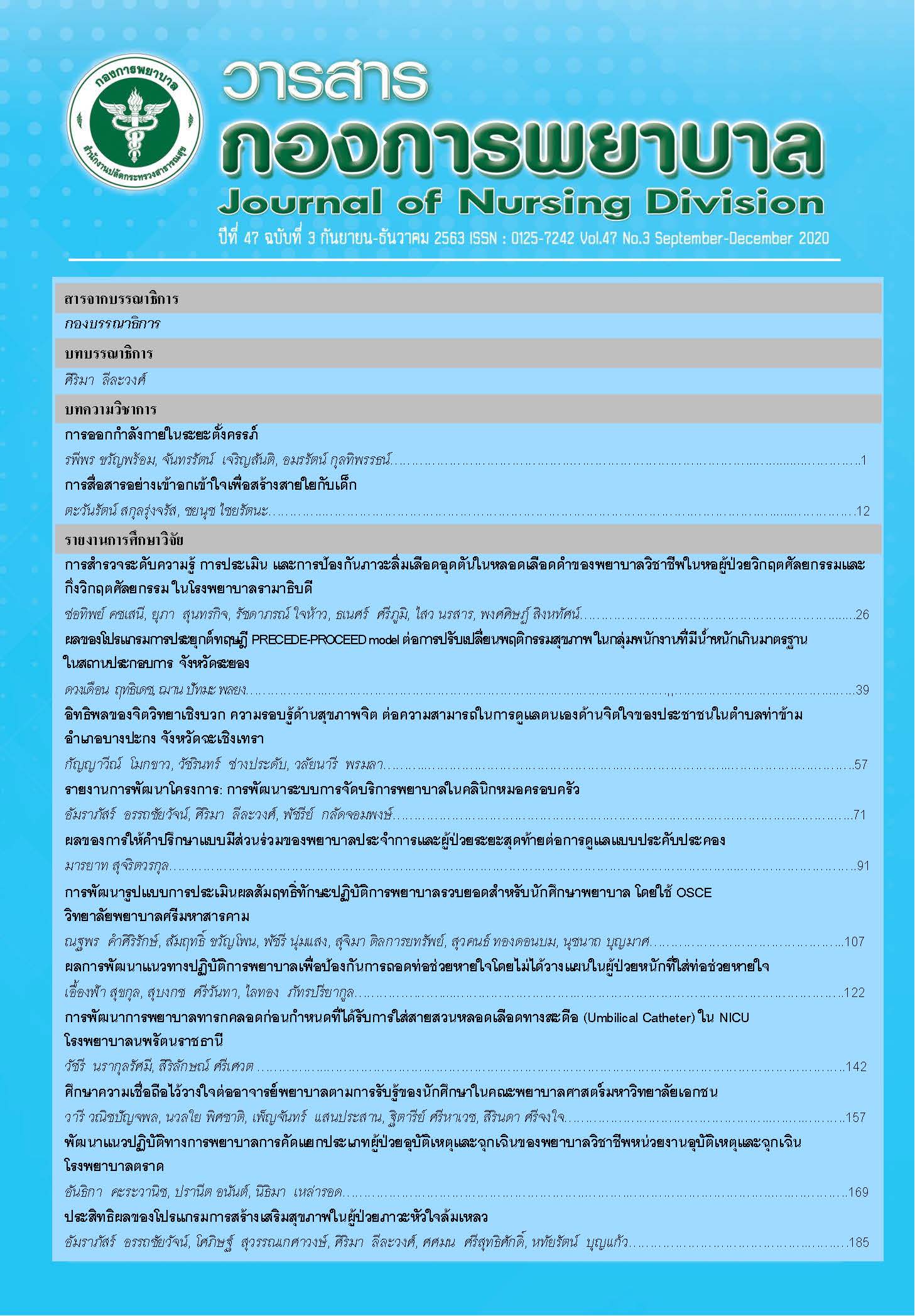ผลของโปรแกรมการประยุกต์ทฤษฎี PRECEDE-PROCEED model ต่อการปรับเปลี่ยนพฤติกรรมสุขภาพในกลุ่มพนักงานที่มีน้ำหนักเกินมาตรฐานในสถานประกอบการ จังหวัดระยอง
Main Article Content
บทคัดย่อ
การวิจัยกึ่งทดลองนี้มีวัตถุประสงค์เพื่อศึกษาผลของโปรแกรมการประยุกต์ทฤษฎี PRECEDE-PROCEED model ต่อการปรับเปลี่ยนพฤติกรรมสุขภาพของพนักงานบริษัทเอกชนที่มีน้ำหนักเกินมาตรฐานในจังหวัดระยอง กลุ่มตัวอย่าง คือ พนักงานในบริษัทเอกชนในจังหวัดระยอง จำนวน 62 คน แบ่งเป็นกลุ่มทดลอง จำนวน 31 คน และกลุ่มเปรียบเทียบ จำนวน 31 คน กลุ่มทดลองได้รับโปรแกรมประกอบด้วย กิจกรรมของปัจจัยนำคือ อบรมให้ความรู้ ให้คำแนะนำอย่างต่อเนื่องผ่านแอปพลิเคชันไลน์ กิจกรรมของปัจจัยเอื้อคือ ปรับปรุงห้องออกกำลังกายให้มีความพร้อม ทำสื่อต่าง ๆ เกี่ยวกับการปรับเปลี่ยนพฤติกรรมสุขภาพ จัดเมนูอาหารและเครื่องดื่มเพี่อสุขภาพ ให้นาฬิกานับก้าว กิจกรรมของปัจจัยเอื้อคือ ให้สมุดบันทึกประจำตัว ประเมินภาวะสุขภาพทุกสัปดาห์ด้วยการชั่งน้ำหนัก เก็บคะแนนพฤติกรรมสุขภาพ ยกย่องชมเชย ประกวดแข่งขันและให้รางวัล สำหรับกลุ่มเปรียบเทียบได้รับการอบรมตามโปรแกรมที่บริษัทจัดไว้ ระยะเวลาในการทดลอง 13 สัปดาห์ เก็บข้อมูลโดยใช้แบบสอบถาม วัดผลก่อนและหลังการทดลอง การวิเคราะห์ข้อมูลทั่วไปใช้สถิติพรรณนา การวิเคราะห์เปรียบเทียบใช้สถิติ Paired sample t-test และ Independent sample t-test กำหนดนัยสำคัญที่ระดับ 0.05
ผลการศึกษาพบว่า ภายหลังการทดลองในกลุ่มทดลองมีทัศนคติต่อการปรับเปลี่ยนพฤติกรรมสุขภาพ สิ่งแวดล้อมที่เอื้อต่อการปรับเปลี่ยนพฤติกรรม การเสริมแรงทางบวกในการปรับเปลี่ยนพฤติกรรม พฤติกรรมสุขภาพด้านการควบคุมอาหาร และพฤติกรรมการออกกำลังกาย มีคะแนนเฉลี่ยมากกว่าก่อนการทดลอง และมากกว่ากลุ่มเปรียบเทียบอย่างมีนัยสำคัญทางสถิติ (p<0.05) และค่าเฉลี่ยดัชนีมวลกายลดลงมากกว่าก่อนการทดลอง และลดลงมากกว่ากลุ่มเปรียบเทียบอย่างมีนัยสำคัญทางสถิติ (p<0.05) ข้อเสนอแนะในการจัดกิจกรรมการลดน้ำหนักที่มีประสิทธิภาพควรใช้โปรแกรมที่ครอบคลุมทั้งปัจจัยภายในตัวบุคคลและภายนอกตัวบุคคล ซึ่งประกอบด้วยปัจจัยนำ ปัจจัยเอื้อ และปัจจัยเสริม สามารถนำไปปรับใช้ได้จริงในชีวิตประจำวันของพนักงานในสถานประกอบการที่เหมาะสมกับสังคมและวัฒนธรรมในองค์กร ทำให้เกิดความต่อเนื่องและยั่งยืนเป็นการป้องกันสาเหตุการเกิดโรคไม่ติดต่อเรื้อรังได้
Article Details

อนุญาตภายใต้เงื่อนไข Creative Commons Attribution-NonCommercial-NoDerivatives 4.0 International License.
เอกสารอ้างอิง
Miranda, H. and et al. Health behavior and overweight in nursing home employees: contribution of workplace stressors and implications for worksite health promotion.[Scientific World Journal]. 2015. [cited 2019 Jan 25]. Available from: http://dx.doi.org/10.1155/2015 /915359. Accessed 25 January 2019.
Prasittipath, T. and et al. Lesson learned from applying the eastern philosophical idea of DaoDe XinXi technique for health behavior modification among employees in the enterprises. The Public Health Journal of Burapha University. 2019;14: 63-77. Thai.
Phanwattana, P. Food consumption behavior of working age people in Bangkok. The Office of Disease Prevention and Control 7 Khon Kaen. 2019;26: 93-103. Thai.
Kaewklin, S. and Prabpai, S. Association between Bio-social factors and health behaviors with dyslipidemia among employ -yees of Thai Nam Thip company at Changwat Pathum Thani. Journal of the Royal Thai Army Nurses. 2017;18: 56-63. Thai.
Kamonpornmongkol, P. and et al. The confirmatory factor analysis of health promo -tion in exercise for employees in the work places. Journal of Nursing and Education. 2017;10: 16-33.
Ministry of Public Health. Annual report 2016. The War Veterans Organization of Thailand Press. Bangkok; 2016. Thai.
National statistical Office Ministry of Digital Economy and Society. Statistical Yearbook Thailand 2017. Ministry of Interior (Department of Provincial Administration). Bangkok: Bangkok Block Ltd., Part. 2017. Thai.
Arora, D. and et al. Cross sectional survey on association between alcohol, Betel-Nut, cigarette consumption and health promoting behavior of industrial worker in Ghaziabad. Asian Pacific Journal of Cancer Prevention. 2015; 6: 139-144.
Ministry of Public Health. Guidelines for the practice of prevention and care for obesity. Institute of Medicine Research and Technology Assessment. Bangkok. The Agricul- tural Co-operative Federation of Thailand Press. Bangkok; 2010. Thai.
Bhunthuwate, N. and Absuwan, A. Campaign on chronic non-communicable diseases. [ Internet] 2009. [cited 2019 Feb 2]. Available from: http://203.157.184.6/Newaumpher/ fileupload/1892ncd2552.pdf. Thai.
Goetzel, R. Z. and et al. (2009). First-year results of an obesity prevention program at The Dow Chemical Company. Journal of occupational and environmental medicine/American College of Occupational and Environmental Medicine. 2009;51(2): 125.
Intarakamhang, U. and Netthip, W. Causal relation model of person and job environment factors to service behavirors in health promotion and disease prevention among health care providers. Journal of Behavioral Science. 2012;18: 33-46. Thai.
Klein, S. and et al. Waist circumference and cardiometabolic risk: a consensus statement from shaping America's health: Association for Weight Management and Obesity Prevention; NAASO, the Obesity Society; the American Society for Nutrition; and the American Diabetes Association. Obesity. 2007;15(5): 1061-1067.
Green, L.W. and Kreuter, M.W. Health promotion planning an education and ecological approach. 4th edition. Mountain View, CA : Mayfield. 2005.
Salinero-Fort, MA. and et al. Effectiveness of PRECEDE model for health education on changes and level of control of HbA1C, blood pressure, lipids, and body mass index in patients with type 2 diabetes mellitus. BMC Public Health. 2011;11: 267-276.
Powwattana, P. and et al. Health promotion and disease prevention in community: an application of concepts and theories to practice. 3 rd ed. Khon Kaen. Klungnana Vitthaya Press. 2013. Thai
Ua-Kit, N. and Pensri, L. Utilization of the PRECEDE MODEL in health promotion. Thai Red Cross Nursing Journal. 2019;12: 38-48. Thai.
Legyam, S. and et al. Knowledge, Attitude, Consumption behavior and nutritional condi -tion of overweight people participating in a counseling programme for nutrition and community relation: a follow-up study. Thai Journal of Nursing Council. 2017;32: 126-137. Thai.
Ponghan, P. and et al. Effects of health promotion on metabolic syndrome preventive behaviors among health volunteers. Journal of Nursing and Health Sciences. 2011;5: 54-64.
Suthirit, S., Pinchaleaw, D. and Keskomon, T. The effectiveness of self-regulation program with line application among overweight health volunteers, Tharongchang district, Surat Thani Province. JOPN. 2018;10: 330-339. Thai.
Noofong, Y. and Ayae, M. The effects of dietary and exercise self-regulation program on dietary and exercise behavior and body weight of obese students. Songklanagarind Journal of Nursing. 2016;36: 78-92. Thai.
Ruangsongkram, J., Tiamjan, R., and Sirisawang, W. Factors related health promoting behavior of public health volunteers in Faham subdistrict, Muang Chaingmai district, Chaing Mai Province. Journal of Graduate Research. 2015; 6: 172-183. Thai.


